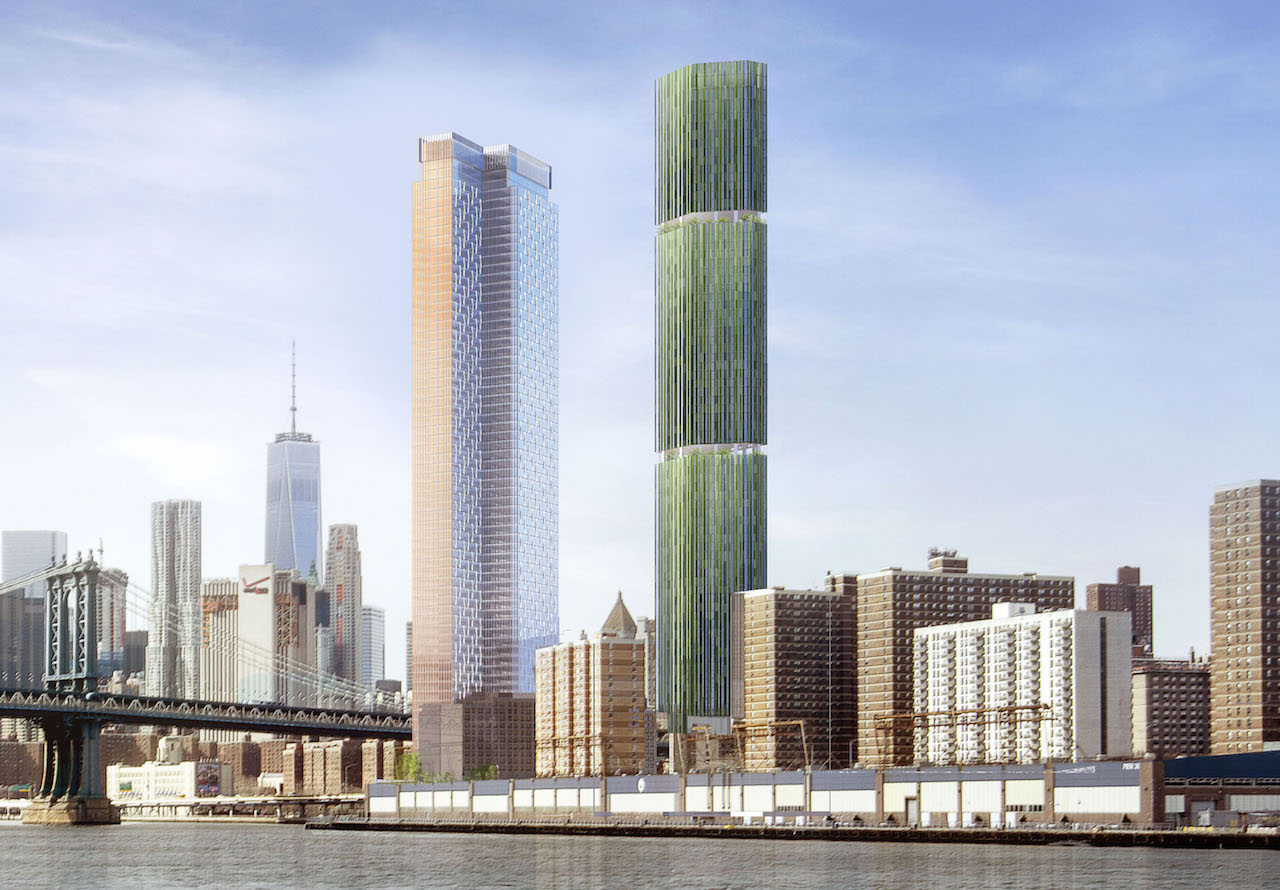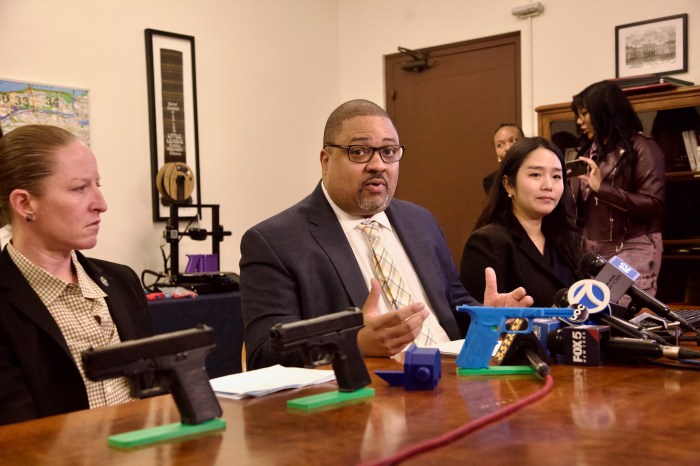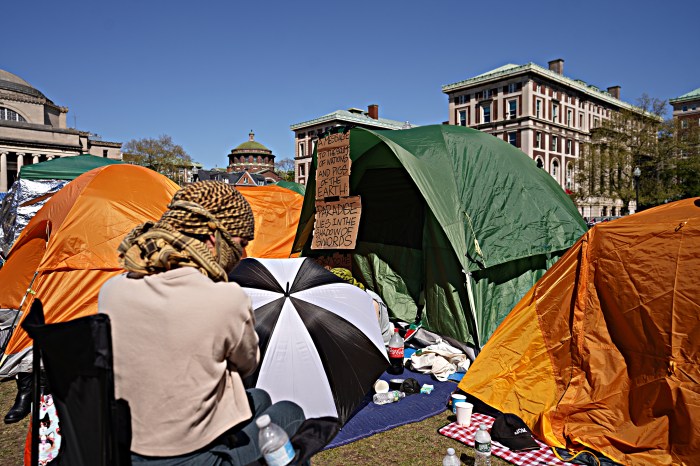
BY LESLEY SUSSMAN | Community Board 3 got an earful last Tuesday night from a coalition of Lower East Side activists who complained that the board was dragging its legs in the battle to stop the proliferation of luxury high-rises, hotels and other upscale developments that are displacing poor people who live in the neighborhood.
Members of the Chinatown Working Group — a coalition of grassroots organizations whose goal is to draft a master plan that would preserve housing affordability in a wide swath of Lower Manhattan — spoke out angrily at the full board meeting at P.S. 20 on May 24. They repeatedly demanded that C.B. 3 at its next monthly meeting issue a strong statement of support for the coalition’s housing preservation agenda.
“We want you to sign a pledge at your June meeting that says ‘no’ to more luxury development,” a C.W.G. member said. “This community board must stop dragging its legs on this issue. Low-income people on the Lower East Side and Chinese people in Chinatown are being treated as second-class citizens by the city and developers.”
A representative of the National Mobilization Against Sweatshops pointedly asked C.B. 3 Chairperson Gigi Li whether the community board was being “complacent “ on this issue.
“Do you stand with us or with de Blasio and the developers,” he said. “Are you going to leave us vulnerable to high-rise developers?”
Francisca Benítez, a member of C.W.G. and Chinatown & Lower East Side Artists Against Displacement, or CLAAD, made a desperate plea for action.
“Passing the C.W.G. plan is now more urgent than ever, with Extell and other skyscrapers being built on the Lower East Side waterfront,” she said. “C.B. 3 should support the community’s demand to stop Extell, and to ensure that no public subsidies or public assets be used to build luxury high-rises. Please sign the Chinatown Working Group pledge, and make a commitment to stand by the plan in full. We need C.B. 3 to help move the plan forward.”
Li responded that the community board is very involved on the issue, which will, again, be on the agenda of next month’s Land Use Committee meeting. Li later told this newspaper that the community board has been working hard to come up with a plan that would stop the proliferation of high-rise luxury development on the Lower East Side.
“We’ve been very involved with the Chinatown Working Group for the past seven years,” she said. “We remain involved and will continue to discuss how C.B. 3 can be most effective in moving the group’s zoning plan forward. It’s understandable that there’s frustration about the time it’s taken to work out the details. Hopefully, we can soon work out a beneficial plan.”
Board member Enrique Cruz, meanwhile, said after the meeting that the community board supports C.W.G. on the issue of curbing rampant development, but that C.B. 3, unfortunately, does not have the final call on this issue.
“We’re wholeheartedly on the side of the groups who want to stop massive high-rise and luxury development buildings in the area,” he said. “The board has already approved the Chinatown Working Group plan. But the problem is that there are different pockets of land involved, so it’s taking longer than expected to finalize a cohesive plan. The board has already reached out and met with city planners on this issue. But we’re not the final decision makers and I understand the frustration of these groups.”
The de Blasio administration rejected the C.W.G. plan for a Chinatown / Lower East Side Special District in March of last year, calling it “not feasible at this time.”
C.B. 3 member Vaylateena Jones said that the situation is urgent.
“What can we do quickly?” she asked. “There’s an onslaught of gigantic buildings being put up in our neighborhood that are charging gigantic rents. How can we halt this?”
On another matter, the names of candidates who will be running for C.B. 3’s leadership positions next month were announced.
Li — who is running for Assembly — is not seeking re-election to a fifth straight one-year term as board chairperson. Instead, three candidates will vie for the board’s top post, incuding Anne Johnson, Jamie Rogers and Enrique Cruz. Karlin Chan and Alysha Lewis-Coleman, the board’s current second vice chairperson, are running for first vice chairperson. Herman Hewitt, the board’s current first vice chairperson, is running for second vice chairperson. David Crane is running for treasurer, and Meghan Joye for secretary.
It was also announced at the meeting that Seward Park was the winner of the Parks Without Borders Competition. The Lower East Side greensward was one of eight recipients throughout the city that will split a $40 million grant for large-scale park renovations.
Residents have long complained that the park was not up to par, pointing to its fountain, which has long been out of use, play equipment with chipped paint and few entry points.
In other board business, C.B. 3 unanimously recommended approval of the creation of a two-way bike lane on Chrystie St. The plan also calls for the reconfiguration of traffic islands at Chrystie St. north of Canal St. and at Second Ave. north of Houston St. in order to improve traffic flow and increase pedestrian safety. The current Chrystie St. bike lane is highly unsafe, especially on its downtown side, which is often blocked by double-parked vehicles and forklifts, leading to many accidents in recent years.
The board also approved a measure asking that C.B. 3 be allowed to participate in decisions made by the state Liquor Authority regarding the new Alcoholic Beverage Control Law.
Governor Andrew Cuomo last year announced the creation of a working group of industry leaders to recommend revisions to the state’s Alcoholic Beverage Control Laws. The group will review existing provisions and explore approaches to clarify and modernize the 80-year-old statute.

















